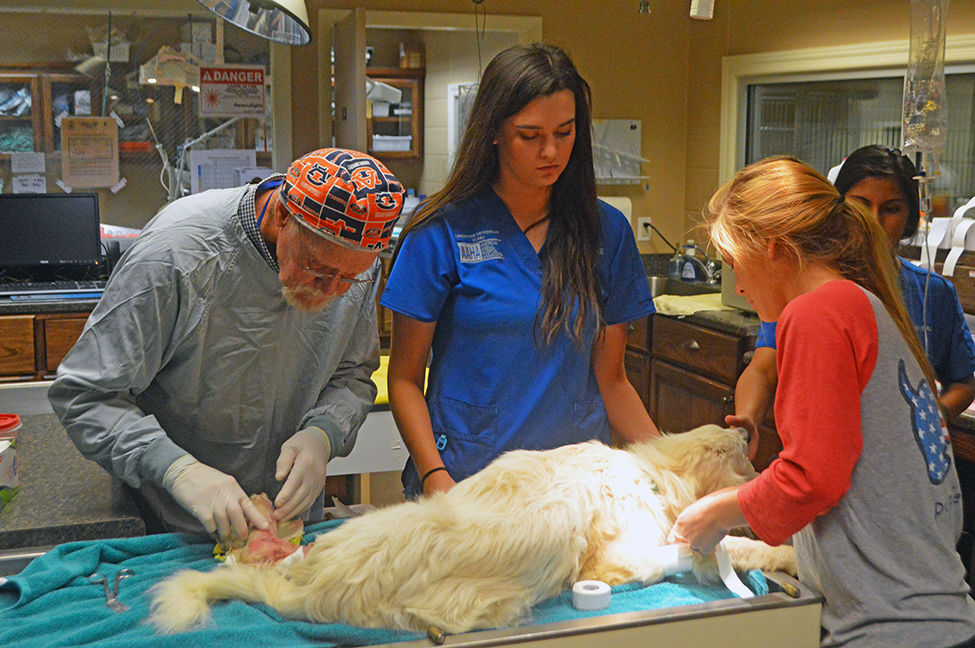ANIMAL CONTROL: City, county asked to pay more
Published 11:00 am Friday, February 7, 2020

- Veterinarian Dr. Robert Pitman, left, and technicians Brooke Berzett and Gabby Patterson work to provide care for a dog at Limestone Veterinary Clinic in Athens.
The veterinarian who holds the animal services contract with both the city of Athens and Limestone County is asking for additional funding, citing the fact he’s losing thousands of dollars each month.
Dr. Robert Pitman, who operates the privately owned Athens-Limestone Animal Shelter, recently provided numbers to the Athens City Council detailing profit versus loss for calendar year 2019. The numbers reflect Pitman took in $592,355.08 but had expenses of $663.316.40, for a loss of $70,961.32.
“(The program) is grossly underfunded,” Pitman said. “I’ve been losing at least $4,000 to $5,000 per month. I’m averaging $30,000 per month on just vaccines.”
Pitman, who also owns and operates Limestone Veterinary Clinic, wants the City Council and County Commission to increase their appropriation to put him more in line with what shelters in other municipalities are paid. He has also requested he be paid an annual salary of $50,000 per year to operate the shelter.
Pitman estimates 20% of all animals turned in to the shelter are from the city of Athens, while 80% are from the county. He said the city funds his services at a rate of $144 per animal, which is based on 729 animals taken from Athens and his council appropriation of $105,000.
He said Limestone County is funding him at a rate of $138 per animal, based on the 2,684 animals taken in from the county and his County Commission appropriation of $372,003.
By comparison, numbers provided by Pitman show the Morgan County Animal Shelter is funded at a rate of $298 per animal, while Huntsville Animal Services is funded at a rate of $240 per animal. Finally, the Florence-Lauderdale shelter receives $160 per animal from local governments.
“The (veterinary clinic) has been subsidizing a lot of (the cost), and so has my checking account,” Pitman said. “The new thrift store brings in $1,000 per week, and we get some donations, but it’s not enough.”
As part of a potential new agreement with Pitman, the city would provide $143,000 per year, or $11,916.67 per month. That figure is based on the city’s 20% of $665,000, which would be $133,000. The city added an additional $10,000, which is 20% of the $50,000 salary Pitman requested.
Councilman Wayne Harper, who is one of two council members Pitman met with this week, said he felt like Pitman’s proposal was fair.
“I think he laid it out real well, and it’s a responsibility we’ve got to meet,” he said. “It’s something I could probably go along with.”
The item will be on the council’s Monday agenda.
Pitman’s contract with Limestone County, which expires Sept. 30, 2021, went into effect Oct. 1, 2018. The original contract stipulates Pitman would be paid $28,571.67 per month in the first year, with an escalation cost of 8.5% each year after. That means Pitman was paid $342,860 in the first fiscal year, and will make $372,003.24 in the current fiscal year. The county will pay Pitman $403,623.60 in the third and final year of the contract.
He said he plans to approach the county next to renegotiate the terms of his contract.
By the numbers
Pitman said there are fewer animals being turned in now than when he took over the service 16 years ago, and fewer animals are being euthanized. In calendar year 2019, 3,413 animals were turned in from both the city and county. Of those, 2,282 were adopted or rescued and 328 were redeemed. Forty-three animal deaths were reported at the shelter, while 780 animals were euthanized.
The first year he began the service, he said, the shelter took in 5,600 animals and he went through 108 bottles of euthanasia. During calendar year 2019, he used 11 bottles of euthanasia.
He recently told The News Courier shelter staff and volunteers have been transporting animals all over the Southeast in an effort to keep the population down. Pitman said the shelter isn’t a rescue, and it’s only required to keep an animal for seven days.
“The kill rate has gone way down, but we’re still struggling,” he said in December.





